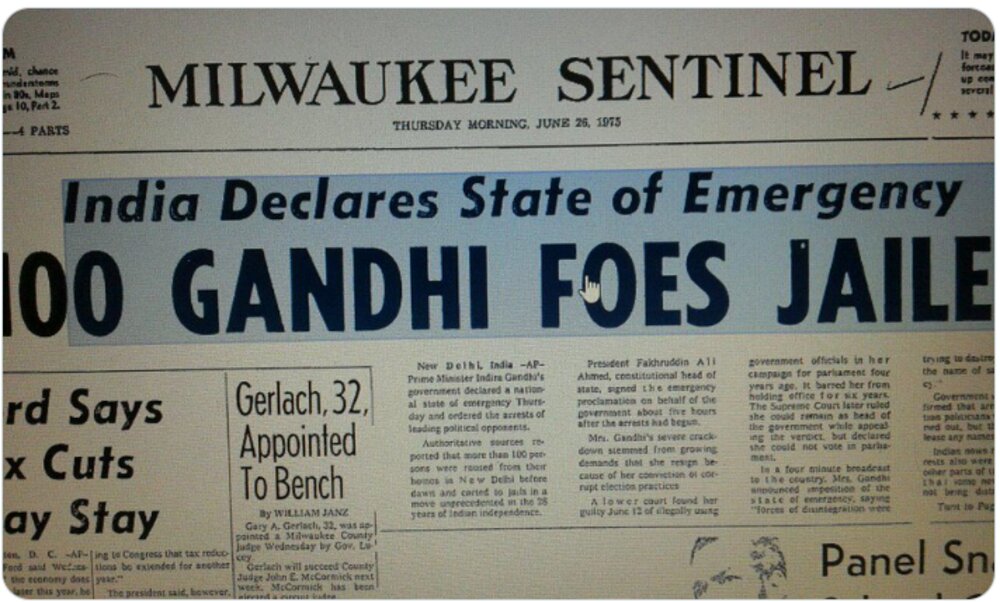Impact on Journalism in Emergency (1975- 1977)
Impact on Journalism in Emergency (1975- 1977)….. During the period of the Indian Emergency, which was imposed by Prime Minister Indira Gandhi from 1975 to 1977, the impact on journalism was significant.
This dark phase of Indian history not only choked the voice of democracy but also had profound consequences for the field of journalism. In this article, we will delve into the specific ways in which journalism was affected and how newspapers played a crucial role in shaping public opinion during this tumultuous time. (Impact on Journalism in Emergency (1975- 1977))
Censorship and Suppression of Freedom
One of the most prominent effects of the Indian Emergency on journalism was the imposition of strict censorship laws. The government, under Indira Gandhi, controlled and monitored the content published by newspapers, making it difficult for journalists to report truthfully.
Publications critical of the government were either shut down or faced heavy penalties, leading to self-censorship among journalists. This suppression of freedom severely limited the capacity of journalists to raise important issues and hold those in power accountable. (Impact on Journalism in Emergency (1975- 1977))
Government Control Over Media Outlets
During the Emergency, the government took control of various media outlets, ensuring they propagated a narrative favorable to the ruling party.
This control over newspapers allowed the government to influence public opinion by disseminating biased information. Journalists had to toe the government’s line or risk losing their jobs, resulting in the manipulation of news stories and the dissemination of propaganda. (Impact on Journalism in Emergency (1975- 1977))
Muzzling the Press through Legal Measures
Indira Gandhi’s government also employed legal measures to silence the press. The infamous Maintenance of Internal Security Act (MISA) and the Prevention of Publication of Objectionable Matter Act (PPOMA) were used to arrest and detain journalists who dared to voice dissent.
Fear became pervasive among journalists, leading to a climate of self-censorship, where they hesitated to report on sensitive issues for fear of reprisals from the government. (Impact on Journalism in Emergency (1975- 1977))
Journalistic Integrity Under Threat
The Indian Emergency posed a severe challenge to journalistic integrity. Journalists faced a moral dilemma, torn between reporting the truth and adhering to the government’s narrative.
Many journalists succumbed to pressure and compromised their principles, leading to a decline in the quality of investigative journalism. The public’s trust in the media was shattered as they witnessed newspapers transforming into mouthpieces of the government. (Impact on Journalism in Emergency (1975- 1977))
Sensationalism and Shallow Reporting
Under the threat of government censorship, newspapers resorted to sensationalism and shallow reporting to avoid controversy. Instead of providing in-depth analysis and objective reporting, newspapers relied on sensational headlines and superficial coverage. The essence of responsible journalism was gradually eroded, leaving the public with distorted and incomplete information.
Manipulation of Public Opinion
With control over media outlets and the suppression of dissenting voices, the government manipulated public opinion to consolidate its power. Newspapers became tools to disseminate government propaganda, creating a distorted version of reality.
The public’s ability to critically analyze information was compromised, impacting their understanding of the true extent of the Emergency and its consequences. (Impact on Journalism in Emergency (1975- 1977))
Resilience: Newspapers as Beacons of Hope
Despite the challenges posed by the Indian Emergency, some newspapers remained steadfast in their dedication to truthful journalism. These publications became beacons of hope in a sea of government-controlled media, providing accurate news and serving as the voice of the people. These newspapers played a crucial role in keeping the spirit of democracy alive and reminding the public of their fundamental rights.
The Courageous Journalists
Despite the risks involved, some journalists showed tremendous bravery and continued to report truthfully during the Emergency. Their dedication to their profession and their determination to uphold the principles of journalism exemplified the resilience of the press during this dark period in Indian history. These journalists became heroes and garnered immense respect from the public for their unwavering commitment to the truth. (Impact on Journalism in Emergency))
The Power of Independent Journalism
Independent newspapers, though limited in number, emerged as a ray of hope during the Emergency. These publications provided a platform for dissenting voices and challenged the government’s narrative. Their commitment to unbiased reporting and investigative journalism strengthened the foundations of democracy, nurturing a space for public discourse and accountability.
Conclusion (Impact on Journalism in Emergency (1975- 1977))
The Indian Emergency marked a dark time for journalism in India, with severe consequences for freedom of the press and the integrity of news reporting. The censorship and suppression of journalists severely limited their ability to report truthfully, resulting in a decline in journalistic integrity and the manipulation of public opinion.
However, despite these challenges, some newspapers and journalists displayed immense resilience, becoming beacons of hope in the fight for democracy. Their unwavering commitment to truth and integrity serves as a reminder of the invaluable role journalism plays in safeguarding democracy even in the face of adversity.
READ MORE
- The Indian Emergency: A Significant Period in Indian History
- World UFO Day 2nd July: Unveiling the Mysteries Beyond the Stars
- Difference Between Capital Investment and Investment
- Dr. Rajendra Prasad: The First President of India
- Three Pillars of the Indian Constitution: Liberty, Equality, and Fraternity

